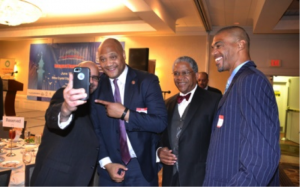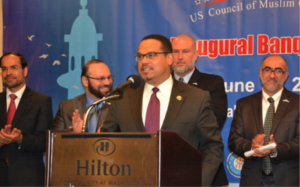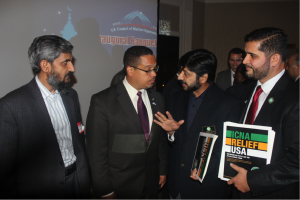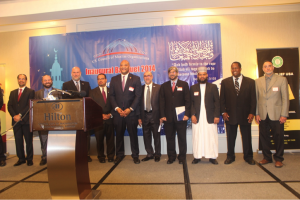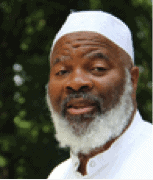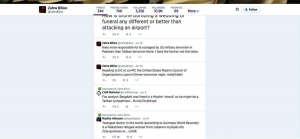U.S. Muslim Brotherhood Political Party Convenes for Inaugural Banquet in Washington, DC Area
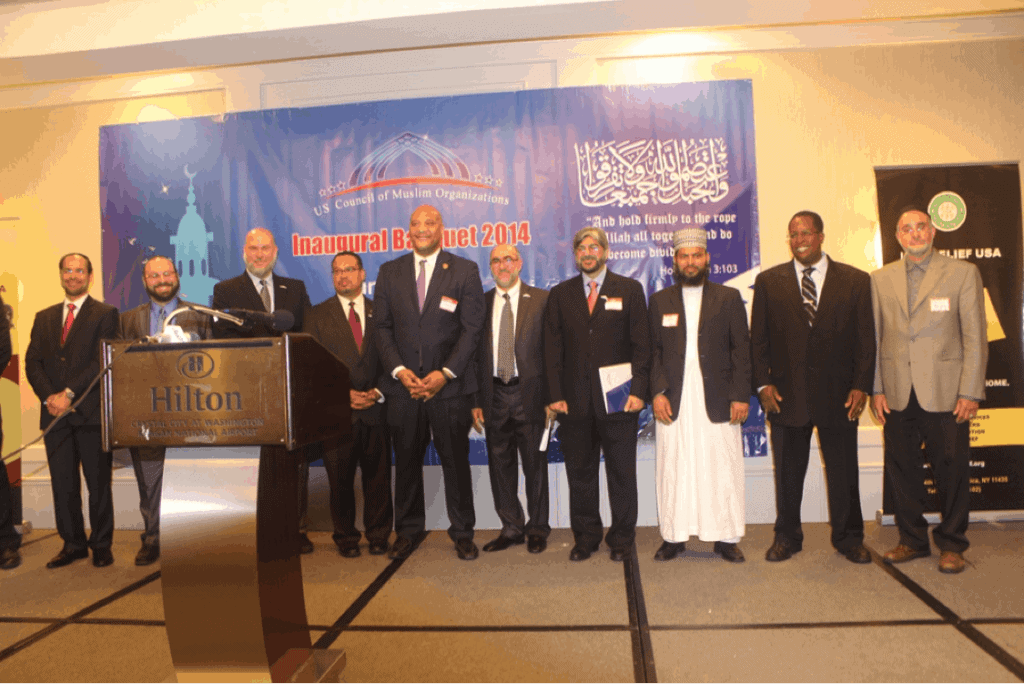
Weeks following the March 2014 announcement in Washington, D.C. by executive leadership from some of the most prominent American Muslim organizations about their formation of the United States Council of Muslim Organizations (USCMO), the U.S. Muslim Brotherhood political party, and indeed the first religious identity political party in the history of this country, began preparing for its inaugural banquet to be held at the Hilton Crystal City Hotel on Tuesday, 10 June 2014.
While limited information exists regarding the actual content of speeches and proceedings from the USCMO inaugural banquet, the Muslim Link Paper reported nearly “250 guests of the member organizations, leaders and imams of masajid, elected and government officials, dignitaries, civic and interfaith partners attended the banquet.” Two members of the U.S. Congress, Representatives André Carson (Democrat, IN-7th District), Keith Ellison (Democrat, MN-5th District), and Hassan El-Amin, Associate Judge, Prince George’s County Circuit Court, 7th Judicial Circuit (Maryland) joined together on the speaker’s dais with Muslim Brotherhood leadership to address the attendees.
A guest at the inaugural USCMO banquet takes a “selfie” photo with Congressman Andre Carson.
The founding leaders of USCMO react to Congressman Keith Ellison’s address.
ICNA Relief’s board chairman Mohsin Ansari talks to Congressman Keith Ellison of Minnesota
US Congressmen Keith Ellison and Andre Carson with USCMO Members
As reported by the United States Council of Muslim Organizations, confirmed speakers for its inaugural banquet included the following:
 Congressman CongressmanAndre Carson |
 Dr. Ihsan Bagby Dr. Ihsan Bagby |
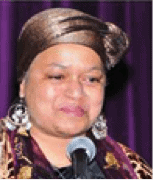 Sister Ayesha Mustafa Sister Ayesha Mustafa |
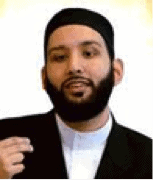 Imam Omar Suleiman Imam Omar Suleiman |
 Judge Hassan El-Amin Judge Hassan El-Amin |
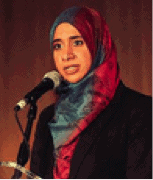 Sister Zahra Billoo Sister Zahra Billoo |
 Dr. Altaf Husain Dr. Altaf Husain |
Dr. Ihsan Bagby, who delivered the keynote address, is from the University of Kentucky and a convert to Islam, board member of both ISNA and CAIR, and General Secretary for the Muslim Alliance in North American (MANA). Bagby shared with the audience “a short sojourn through the history of American Muslims starting from the early Africans who were forcibly brought by slave traders to early immigrants to the present. He traced the history of other umbrella organizations that had formed and pointed out the reasons of their demise, urging the council to learn from their mistakes.”As reported by the Muslim Link Paper, others in the speaker line-up included Dr. Ousama Jammal, Secretary General, USCMO; Dr. Osama Abu-Irshaid, Board Member, American Muslims for Palestine; Nihad Awad, National Executive Director, Council on American Islamic Relations; Naeem Baig, President, Islamic Circle of North America; Mazen Mokhtar, Executive Director, Muslim American Society); Khalil Meek, Executive Director, Muslim Legal Fund of America; Imam Delawar Hussein, Dr Lynne Muhammad, Founder, Making A Difference Through Discoveries, American Islamic College, Whitney Young Magnet High School; and W.D. Mohammed II, President, Mosque Cares.
The June 2014 USCMO inaugural banquet was sponsored by Helping Hands USA (also known as Helping Hand for Relief and Development), ICNA Relief USA, and Guidance Residential, the largest U.S. provider of Sharia-compliant home financing. Notably, the only Muslim charity invited to speak at the formation of the U.S. Council of Muslim Organizations in March 2014 was ICNA’s fund, ICNA Relief USA.
Maqsood Ahmad, Executive Director, ICNA Relief USA stated during the banquet that “America is our home and ICNA Relief USA has a goal of making it a better place with Islamic values of compassion, care and giving.” Recall that ICNA is the progeny the Muslim Students Association and the jihadist Jamaat-e-Islami movement.
In 2012, ICNA Relief USA received a $30,000 grant from none other than Helping Hand for Relief and Development, a Michigan-based Islamic charity with links to a Pakistani front charity that funds HAMAS. In 2006, the Pakistani charity Al-Khidmat Foundation gave a 6 million rupee check to HAMAS leader Khaled Meshaal.
Muslim Brotherhood founder Hassan al-Banna, who established the al-Ikhwan al-Muslimin in Egypt in 1928 is quoted in the 1988 HAMAS Charter declaring that “Israel will exist and will continue to exist until Islam will obliterate it, just as it obliterated others before it.”
The Muslim Link Paper declared that “the [USCMO] banquet was the official introduction for the Muslim community to a platform that promises to open effective communication between Muslim organizations in America and build a national vision.”
Imam Omar Ahmad Suleiman, member of ICNA’s Shariah Council, represented next generation Muslim Brotherhood leadership in the U.S. and “spoke about what diversity and race relations means to his generation. He expressed great hope for the growth of the council.”
The USCMO’s selection of Zahra Billoo and Altaf Husain as its emcees for the June 2014 inaugural banquet is regrettably notable, especially as USCMO General Secretary Ousama Jammal began the day by introducing “the mission of the council to the audience: bringing American Muslim organizations together.” In scope and ambition, this mission appears to be part of the “broad agenda” that Nihad Awad discussed – “In the past, many people have tried to unite on a limited agenda, but this is a broad agenda for the American Muslim community” – when the USCMO officially announced its formation in March 2014. Broad, indeed, in an anti-American, antisemitic agenda if public statements of at least one of its emcees are part of that. Earlier that same day before the USCMO inaugural banquet began, Zahra Billoo, Executive Director of CAIR’s San Francisco Chapter, known for her history of publicly-expressed anti-American and anti-Israel sentiment, revealed on Twitter her sympathies for the Taliban, stating that she felt “more responsible for and outraged by US military terrorism in Pakistan than Taliban terrorism there. I fund the former not the latter.” Billoo self-describes as an “American, Pakistani, litigious, feminist, hippie, anarchist, outspoken, rebellious, socially conscious Muslimah.”
Although the Islamic Society of North America (ISNA) is not yet an official member of the USCMO, emcee Altaf Husain is a member of ISNA’s Majlis Ashura. Husain serves as a faculty member of COMPASS – the Muslim Student Association’s state of art management training program; he is also a board member and chair for ISNA’s Leadership Development Committee. He was past two-term national president of the Muslim Student Association and an executive committee member of the Muslim Alliance in North America. It is likely only a matter of time before ISNA officially joins forces with the USCMO.
Since the announcement of the USCMO’s formation in March 2014, three new Islamic organizations have joined its founding members: Islamic Shura Council of Southern California, United Muslim Relief, Virginia, and Islamic Center of Wheaton, Illinois. Just over eighteen months ago, Tariq Ramadan, grandson of Muslim Brotherhood founder Hassan al-Banna, served as a catalyst for action from Muslims in the U.S.
On Sunday, 21 December 2012, Ramadan issued a strong directive to Muslims participating at the 11th Annual MAS-ICNA Convention in Chicago, Illinois, and emboldened the audience when he stated,
“So this is why Muslims when they say we are at home should institutionalize the presence in the country…We are at home, show it! Not show it with what you say, show it with the institutions you have in this country – institutionalize the Muslim presence as Americans. This is home; this is where we can say ‘that’s where we are’…I think we are reconciling the West with the very essence of our universal principles – if we understand Islam the right way, if we understand why we are experiencing this historical moment of the Muslim presence in the West.”
As the USCMO members actively institutionalize their presence, the new coalition of U.S. Muslim organizations would seem to be off to a successful launch, a feat that eluded earlier efforts to unify ideologically-similar but nevertheless discrete American Muslim Brotherhood groups under any sort of political umbrella organization. Previously, in December 1997, seven national Islamic organizations had convened unsuccessfully in Sunnyvale, CA to “signify support for the unity process” and provide “coordinated advice to America’s six million Muslims on political issues and candidates with creation of a national Coordination Committee.” Those organizations at the time included the American Muslim Alliance (AMA), Fremont, CA; American Muslim Caucus (AMC), Dallas, TX; American Muslim Council (AMC), Washington, DC; Council on American-Islamic Relations (CAIR), Washington, DC; National Council on Islamic Affairs, New York City; the Muslim Public Affairs Council (MPAC), Los Angeles; and the Islamic Society of North America (ISNA).
This history of failed efforts by earlier U.S. Muslim organizations to combine efforts and unify leadership for political ends underlines the importance of the current and apparently more successful USCMO initiative. Certainly, the current political climate offers opportunity not previously available to achieve the long-time Brotherhood goal of advancing the “Phases of the World Underground Movement Plan” in accordance with the framework articulated by influential Muslim Brotherhood theoretician Sayyid Qutb in his seminal 1964 monograph Milestones.
- Military Starship: How SpaceX Is About to Make America Globally Dominant - March 4, 2025
- The Cautionary Tale of Zheng He - December 4, 2024
- Frank Gaffney departs CSP after 36 years - September 27, 2024

